Iran Abstains On UN Resolution Deploring Russian Invasion
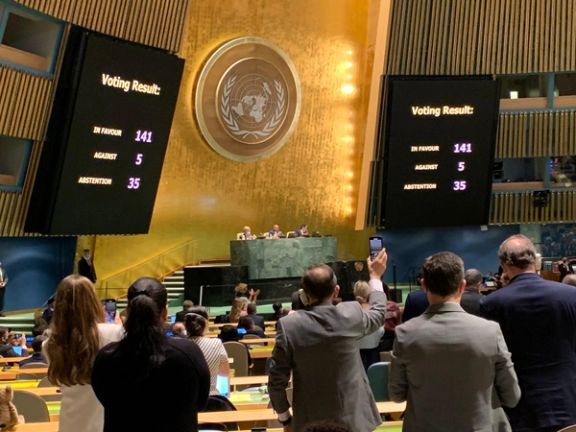
The Islamic Republic abstained from voting on a UN General Assembly resolution deploring the Russian invasion of Ukraine and urging the immediate withdrawal of the troops.

The Islamic Republic abstained from voting on a UN General Assembly resolution deploring the Russian invasion of Ukraine and urging the immediate withdrawal of the troops.
In an emergency session on Wednesday, the United Nations General Assembly overwhelmingly voted to condemn Russia over its attacks and demanded that Moscow stop fighting.
The resolution "deplores"Russia's "aggression against Ukraine." Although General Assembly resolutions are non-binding, they carry political weight.
Some 141 of the 193 member states voted for the resolution, and 35, including Iran and China, abstained the move aimed at diplomatically isolating Russia at the world body.
Russia itself, North Korea, Syria, Belarus and Eritrea were the only five that voted against the resolution.
A similar resolution was not upheld in the Security Council on Friday because Russia – as one of the five powers with a veto power – vetoed it. Ukraine’s allies referred the matter to the general assembly.
The last time Security Council referred a crisis to the Assembly was in 1982. It is only the 11th time an emergency session of the UN general assembly has been called since 1950.
Iran’s president and other officials have supported Russia’s move by blaming the United States and NATO for provoking the invasion
Iran’s state media and hardliner outlets have avoided using the word ‘invasion,’ while conservative and reformist media have in some instances criticized Russia for the invasion or expressed more nuanced views.
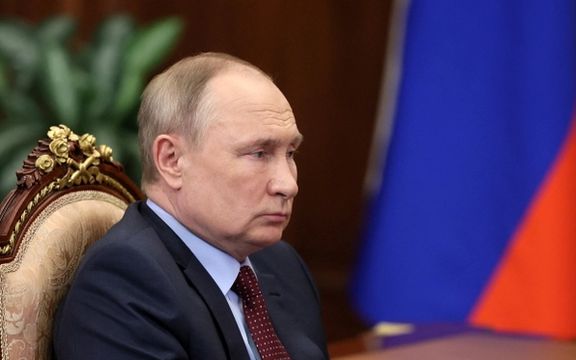
Fear of uncertainty and possible legal entanglements have made global banks jittery about dealing with Russia, similar to Iran's experience with sanctions.
Faced with an unprecedented level of sanctions on Russia, banks are taking a dim view of business with all Russian entities and dropping clients if there is even a slight doubt on their ties to that country, Reuters quoted bankers and lawyers as saying.
While European and North American governments have introduced serious banking and other business sanctions, countries in Asia and Elsewhere are introducing their own restrictions.
Sanctions experienced by Iran went a bit farther than those announced against Russia, such as cutting off all banks, instead of a select group, and the central bank from the global SWIFT. But the overall psychological and legal impact appear not be too different.
While global banks have extensive experience with sanctions and have invested billions of dollars in compliance programs in recent years, the curbs on Russia are unmatched in their scale, speed and complexity and may yet grow, said executives. Russia was a much larger financial player before the sanctions than Iran ever was.
To avoid falling foul of the rules and having assets and capital ensnared by new curbs, banks are adopting extreme caution in all of their dealings with Russian entities, actions that will likely exacerbate global trade disruptions, said bankers and lawyers.
The United States alone fined banks billions of dollars for breaching its OFAC (Office of Foreign Asset Control) restrictions since 2010. BNP alone was fined $8.9 billion in 2014, while Commerzbank and HSBC were also fined in billion-dollar figures. From 2010-2019, the US took action against 32 banks and all paid penalties.
Many of these cases were related to Iranian sanctions violations, which has made international banks extremely careful in their dealings.
A senior Hong Kong-based Asia trade finance banker with a global lender told Reuters that his compliance colleagues are asking more questions even if a financing deal involves a non-sanctioned Russian entity, directly or indirectly.
The issue is not just current sanctions, but what may still come. "It's not just managing risk from the existing sanctions, but also thinking about what more could possibly happen on that front," an Asian banker told Reuters. "No one would like to sign a billion-dollar trade finance deal only to be told a week later that the entity in Russia has also been added to the sanction list."
There is also the danger of aftereffects even when sanctions are removed. Iran experienced this syndrome when it resolved its nuclear issue with world powers in 2015 and international sanctions were lifted.
From 2016-2018 when most economic sanctions were removed, Iran had a hard time to get major deals and joint ventures. While the country needed tens of billions of dollars in investment, it was able to secure just a few billion dollars.
The fear that a regime is unpredictable and sanctions can be reimposed for new unacceptable actions, will keep the financial sector and corporations away from a country which has emerged from sanctions.
Charlie Steele, partner at Washington-based consultancy Forensic Risk Alliance and a former US Treasury Department sanctions attorney told Reuters, "Banks generally, and certainly the global banks, often tend to be very cautious and conservative with respect to sanctions, especially U.S. sanctions.”
With reporting by Reuters
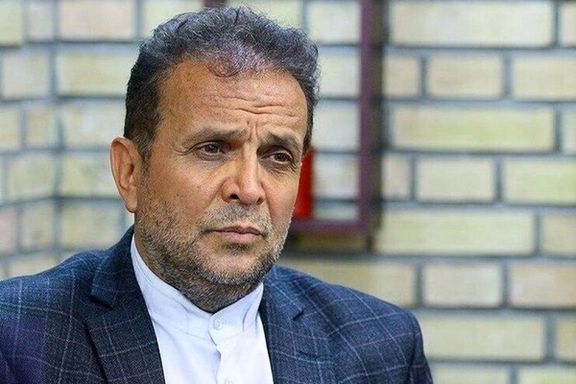
A senior Iranian lawmaker says the Islamic Republic’s position is close to that of Moscow on the issue of the Russian invasion of Ukraine.
The spokesman of the parliament's National Security and Foreign Policy Committee, Mahmoud Abbaszadeh-Meshkini, said on Wednesday that NATO has gone far beyond its territory in recent years and has faced a response from Russia.
He described the Russian attack on Ukraine as “a precautionary measure” to push NATO back to its place, noting that NATO did the same to Iran. “To surround us, they occupied Iraq and Afghanistan and imposed war on Syria, and the Islamic Republic helped to prevent larger wars at the request of their governments”, he added.
Abbaszadeh-Meshkini noted that there is a common problem in the world, and that is “the Westerners have expanded their hegemony with the help of NATO and are occupying wherever they want under the name of ‘preventive war’”.
The Islamic Republic has subtly supported Russia since the invasion began by accusing the United States and NATO of provoking the conflict.
Pundits and media in Iran are still heatedly debating the Russian invasion of Ukraine, West's reaction and Iran's official stance of implied support for Russia.
Iran’s state media and hardliner outlets have avoided using the word ‘invasion,’ while conservative and reformist media have in some instances criticized Russia for the invasion or expressed more nuanced views.
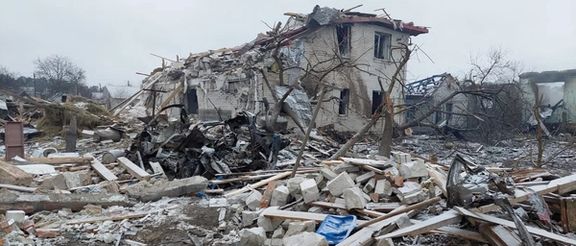
Pundits and media in Iran are still heatedly debating the Russian invasion of Ukraine, West's reaction and Iran's official stance of implied support for Russia.
In a televised speech Tuesday, Iran's Supreme Leader detected a ‘colored coup’ in Ukraine, referring to past United States-backed ‘colored revolutions’ in eastern Europe.
Ali Khamenei said Iran was “in favor of stopping the war,” which he blamed on the United States and Nato, following President Ebrahim Raisi earlier explaining the Ukraine crisis in terms of Nato’s eastern expansion, which has taken in 13 countries since 1999.
Iran’s state media and hardliner outlets have avoided using the word ‘invasion,’ while conservative and reformist media have in some instances criticized Russia for the invasion or expressed more nuanced views.
Kayhan newspaper, the hardliner flagship, has blamed Nato and the US. A note published Wednesday contrasted Iranians who defended their country against the 1980 Iraqi invasion, while Ukrainians did not even "pretend to resist as much as a scarecrow" and fled across the borders.
Kayhan’s statement was labeled as an insult to the Ukrainian people on social media, while the comment obviously contrasts with international admiration for Ukrainian people’s resistance.
The conservative Alef has both censured Russia over the invasion and argued out Nato had set Ukraine up as a victim. Like most other countries in the Middle East, Alef said, Iran should remain neutral and try to contribute to a diplomatic solution.
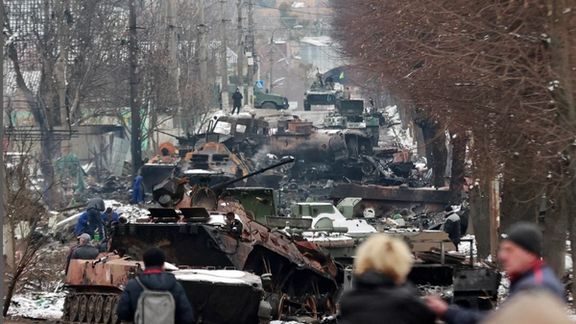
Double standards
Jafar Mohammadi, editor of the conservative Asr-e Iran website, was also nuanced. "Russia's attack on Ukraine is a clear breach of international regulations and a crime against humanity," he wrote Tuesday, while criticizing Nato for failing to stop Russia. Mohammadi also highlighted double standards over Ukrainian refugees compared to Syrians and Afghans, as well as over Israeli occupations and Saudi Arabia bombing cities in Yemen.
"That they have driven the invading Russia to a corner of isolation and sanctions is a very good measure,” Mohammadi wrote. “That's what an aggressor deserves, but they must show the same response to other aggressions, which they don't, and the outcome is an unsafe world in which even the value of children's blood is measured by the color of their eyes.”
Russia appears to see Iran as an ally in the war against Ukraine. The Russian embassy in Tehran Wednesday published on Twitterand Instagram photos from Iran including an Iranian flag with ‘We Support Russia’ in Persian. It claimed these were from a "flash mob of Iranians in support of the Russian army with the sign 'Z'". A few photos published in the tweet do not show a ‘flash mob.”
Blind enmity
In February, some Iranians expressed anger on social media when the Russian embassy honored Alexander Griboyedov – ambassador, promising writer and friend of Aleksandr Pushkin – who along with all the Russian embassy staff was murdered by a Tehran mob in 1829.
Hundreds of Iranians on social media have been expressing anger at the invasion in the past six days and criticizing the government’s position. Some are attacking Supreme Leader Ali Khamenei, calling him a lackey of Russia.
Reformist commentator Sadegh Zibakalam suggested phobia towards the West and "blind ideological enmity" had prevented Iranian officials from having a realistic understanding of developments such as the Ukraine crisis.
For Zibakalam, this explained notions that Ukraine had been “deceived by the West” or that “Western [powers] are responsible for the war because they wanted to expand Nato towards Russia." Zibakalam took it upon himself Tuesday to apologize to Ukrainians for the Iranian government's stance.
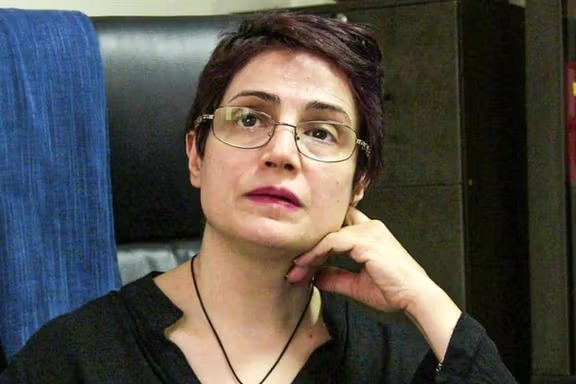
Renowned Iran human rights advocate and political prisoner Nasrin Sotoudeh describes the Russian invasion of Ukraine as war between democracy and dictatorship.
In a letter addressed to UN Secretary-General António Guterres, Sotoudeh praised the resistance by the people of Ukraine, calling on the international community to help the Ukrainian people "who do not want to be silently crushed under the boots of the aggressors".
She said, "This is a war between democracy and dictatorship, but fortunately the Ukrainian people are not alone in this battle, and the world has come to help Ukraine with great concern."
Sotoudeh has taken a risk by her action as she has received a long prison term and is free on temporary basis.
"As a woman who has lived in a country that has been directly involved in war for eight years, I can imagine the horror of the war and the naked violence against defenseless human beings”, Sotoudeh added.
Calling on the secretary-general to use "all international means to end this blatant aggression", she said that “like millions of people around the world, I am terrified of this brazen aggression… world peace is meaningless without standing up to Russian military aggression and supporting Ukraine”.
Sotoudeh is sentenced to 38 years in prison for two open cases in two political cases with vague charges of activities against the Islamic regime.
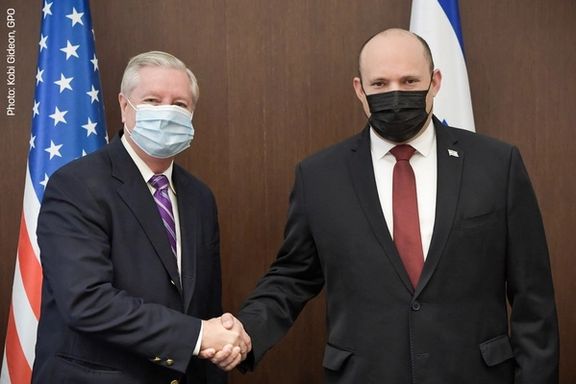
Iran’s mission to the United Nations has protested against a “hateful” speech by US Senator Lindsey Graham during his visit to Israel.
The Islamic Republic’s mission sent an official letter to the UN Security Council condemning the remarks by the Republican lawmaker Iranian scientists being killed, presumably by Israel, to stop Iran’s nuclear program.
“These disgusting, hateful and reprehensible remarks, which act as a green light to the Israeli regime to carry out more terrorist acts against Iranian nuclear scientists, are a clear violation of US international obligations”, the letter read.
During his visit to Israel in mid-February, Graham said, “A lot of Iranian scientists have had a lot of accidents, and we would expect more accidents to come. Having said that, if the Iranian regime sees nuclear weapons as an insurance policy for survivability, it will suffer a lot to get there”.
A supporter of former President Donald Trump’s decision to withdraw from the 2015 agreement, the JCPOA (Joint Comprehensive Plan of Action), Graham also compared Iranians to the Nazis, saying that “Iran is a theocracy motivated by religion [Shia Islam] that compels them to purify their faith and have the world submit. The Nazis wanted a master race, and the Iranians want a master religion. People like that cannot be ignored.”